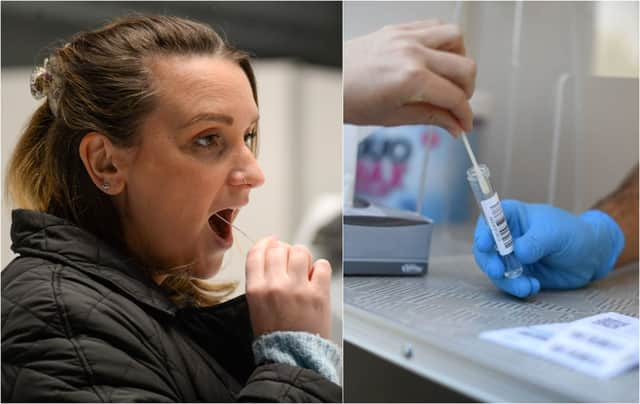PM to send army to Indian Covid variant hotspots to assist with surge testing


The Prime Minister will deploy the army to Indian Covid variant hotspots to assist with surge testing, amid fears the strain could be 50 per cent more transmissible.
Soldiers will be sent to parts of North West England, where most of the cases are concentrated, and there will be “targeted new activity” in Bolton and Blackburn to accelerate the vaccine rollout, Boris Johnson said.
PM urges extra caution
Advertisement
Hide AdAdvertisement
Hide AdSurge testing is already under way in the region in an effort to get cases under control and prevent any further spread.
The ‘variant of concern’ has also been detected in Greater Manchester, Lancashire, Sefton in Merseyside, Tyneside, Newcastle and Glasgow.
The latest data from Public Health England (PHE) shows that the number of cases of the India variant in the UK has increased from 520 last week to more than 1,300 this week.
Speaking at a press conference on Friday (15 May), Boris Johnson warned those living in Bolton and other affected areas that “there is now a greater risk from this new variant” and urged people to be “extra cautious”.
Advertisement
Hide AdAdvertisement
Hide AdMr Johnson said Colonel Russ Miller, Commander of the North West Region, will be “deployed to support local leaders in managing the response on the ground”.
He told the press conference: “There will be surge testing, with mobile testing units, and the army will be on the streets handing out tests.
“And there will be targeted new activity in Bolton and Blackburn to accelerate vaccine take-up among eligible cohorts – including longer opening hours at vaccination sites.”
Surge testing was also announced in Hackney, north-east London, on Friday (14 May) after cases of both the India variant and the South Africa variant were detected. Everyone who lives or works within targeted areas in Shoreditch and Dalston are advised to take a Covid test.
Second vaccine doses brought forward
Advertisement
Hide AdAdvertisement
Hide AdSecond doses of the Covid vaccine will also be brought forward from 12 to eight weeks for those aged 50 and over, and clinically vulnerable, to ensure people have the highest level of protection sooner.
Bolton and Blackburn with Darwen will also be extending pop-up vaccination sites and increasing the vaccination capacity of local pharmacies.
There will also be an increased community engagement programme to ensure as many people as possible accept the vaccine, take regular tests and comply with self-isolation rules if they return a positive result.
Enhanced contact tracing and genomic sequencing to identify the variant is also being deployed across many parts of the North West.
Advertisement
Hide AdAdvertisement
Hide AdBlackburn with Darwen Council initially said on Thursday (13 May) that it would be offering vaccines to all over-18s from next week following the increase in cases, but later said that, although additional vaccine clinics are being set up, the jab will only be offered to those eligible under current government guidance.
Speaking on Sky News, Vaccines Minister Nadhim Zahawi said younger people in areas where there is a surge of the variant could be vaccinated sooner.
He said: “The clinicians will look at all of this to see how we can flex the vaccination programme to make it as effective as possible to deal with this surge in this variant, the B1617.2.
“They will make those decisions and we will be ready to implement.”
Advertisement
Hide AdAdvertisement
Hide AdThe news comes after the Scientific Advisory Group for Emergencies (Sage) said it is “highly likely” the Indian strain is more transmissible - potentially up to 50 per cent - than the one that emerged in Kent, and warned that there could be a peak in infections after Monday’s easing.
Sage said that if higher levels of transmissibility are confirmed, moving to step three on Monday could “lead to a substantial resurgence of hospitalisations, similar to, or larger than, previous peaks”.
The scientists also acknowledged there “may be some reduction in protection” from vaccines on the Indian variant.